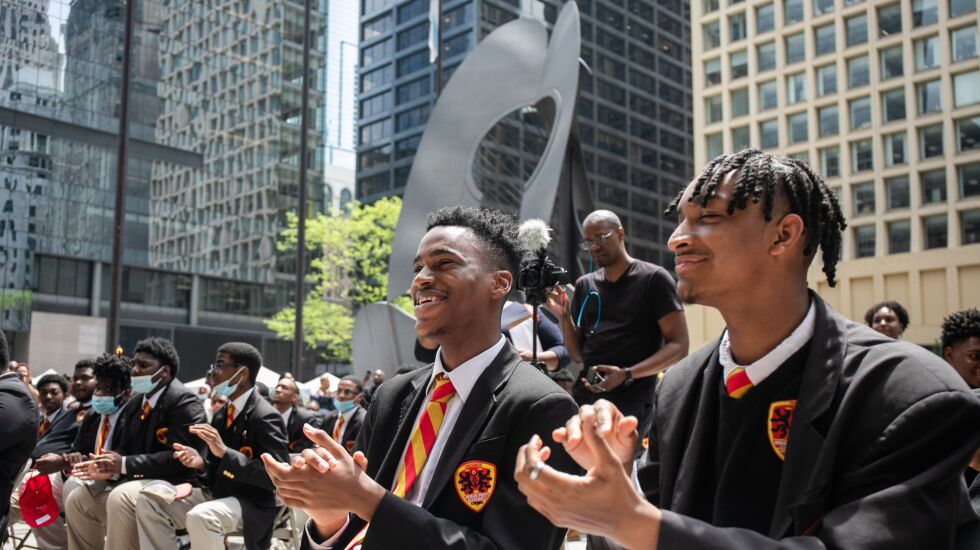
It wasn’t long ago that Urban Prep High School students — young Black men in their signature navy blue jackets and red ties — first made waves in the Chicago education world. Banners boasting of the school’s 100% graduation rate decorated the campus in Englewood, where national leaders paid visits.
The charter school brought a sense of hope to a neighborhood that had been burdened for years by disinvestment and violence.
Fast-forward to the present day, a little over 15 years later, and Urban Prep’s two campuses — fraught with financial trouble, a sexual misconduct investigation, dwindling enrollment and complaints about a lack of special education services and a low number of certified teachers — are poised for a takeover by Chicago Public Schools.
Chicago and other cities where charter schools have proliferated have a lot to learn from the fall of Urban Prep.
Rooting for its success
When I was a high school English teacher at TEAM Englewood, a small CPS school, we shared a building with Urban Prep. I was jealous of Urban Prep and the fanfare surrounding it. The school always seemed to have more faculty positions and resources than our school, not to mention being championed by famous donors like Oprah Winfrey, cheered on by the Chicago White Sox and visited several times by then-Mayor Rahm Emanuel.
But jealousies aside, I wanted Urban Prep to succeed for one main reason: its students. Young Black men, as data from the National Center for Education Statistics shows, have the lowest college graduation rate — 34% — of any racial or gender group. And though CPS has seen a small uptick in high school graduation rates of Black males, the district still is not a beacon for their academic success.
Urban Prep’s mission was to change all that, creating a model that could be replicated nationwide. But now, CPS has moved to revoke Urban Prep’s charter. What happened?
First, quite simply, enrollment matters. Urban Prep, like my former school, emerged during the “Renaissance 2010” reform movement that was a brainchild of then-Mayor Richard M. Daley and then-CPS CEO Arne Duncan. Many high schools created under this initiative were intentionally small. The theory was that smaller schools would allow for stronger relationships between teachers and students, so students didn’t “fall through the cracks” for lack of support.
But these new schools seemed to pop up every year in Englewood, even as others closed. At one time, in the area where Urban Prep is located, seven high schools fought for students even though the student-age population was only large enough for one typical large high school. And these small schools had fewer teachers and extra-curricular activities — so students received a less-robust high school experience.
To make matters worse, CPS also built a new, $85 million high school in the area, as the student-age population continued to decline. It’s hard to compete for students against a school in a shiny new building.
Second, educational leaders need to be mindful of fame and the problems that come with it. Urban Prep’s former CEO, the face and leader since its inception, is Tim King, who was once a People Magazine Hero of the Year. Now, embroiled in a sexual misconduct investigation, Urban Prep is having difficulty shedding his image.
And finally, just as other charter operators have found the hard way, rules and regulations matter. Charter schools often get to play by different rules, and this sometimes leads to poor decision-making that harms students. Acero Charter Schools intentionally changed its name from UNO to Acero when its charter was about to be revoked because of its lack of services to English learners. The often-heralded Noble Prep Charter School network has apologized for punitive discipline policies that harmed students of color. And Urban Prep’s fiscal mismanagement led it to rely on loans, credit cards and cash advances to stay afloat.
These are problems usually associated with a fledgling business, not a school. But the moment education, a social good, followed the “business model,” schools became successes or failures on corporate metrics. In Chicago’s case, schools competed for an ever-dwindling number of students, and many schools have failed, closed, or turned to drastic measures to stay open.
Let the fall of Urban Prep serve as a warning to district and school leaders: Charter schools must be held accountable, the same as traditional public schools. As we tell our students, if we don’t learn from our mistakes, we are bound to repeat them.
Gina Caneva is the library media specialist for East Leyden High School in Franklin Park. She taught in CPS for 15 years and is National Board Certified.
Send letters to letters@suntimes.com
The Sun-Times welcomes letters to the editor and op-eds. See our guidelines.
The views and opinions expressed by contributors are their own and do not necessarily reflect those of the Chicago Sun-Times or any of its affiliates.

.jpg?w=600)





